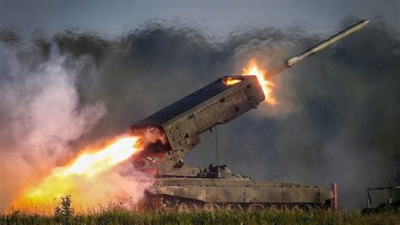Washington Helped Trigger the Ukraine War

To receive Global Research’s Daily Newsletter (selected articles), click here.
Visit and follow us on Instagram at @globalresearch_crg and Twitter at @crglobalization. Feel free to repost and share widely Global Research articles.
***
An article by Yahoo national security correspondent Zach Dorfman praising U.S. intelligence agencies for accurately predicting Russia’s full-scale invasion of Ukraine inadvertently highlights the extent of Washington’s military provocations in Ukraine during the period before the outbreak of hostilities. Those measures went well beyond the ill-advised political decision on the part of George Bush’s administration and its successors to push for Ukraine’s admission to NATO.
Earlier warnings from realist scholars that NATO’s eastward expansion to Russia’s border was poisoning relations with Moscow are finally getting attention in the establishment news media and generating a vigorous debate. A few analysts outside the realism and restraint camp even have conceded that trying to gain NATO membership for Ukraine may have been imprudent. But the magnitude of the aggressive moves taken by the Pentagon and CIA are just now becoming apparent.
For years, the Kremlin made it emphatically clear that inviting Ukraine to join NATO would cross a red line that threatened Russia’s vital security interests. However, it was never merely an issue of Kiev’s formal accession to the alliance. Comments from Russian President Vladimir Putin and other officials signaled that the truly intolerable development was Ukraine becoming a NATO military asset and an arena for the deployment of U.S. and NATO forces. That danger could—and ultimately did—arise, even though France and Germany continued to block a formal membership invitation.
Evidence grew in recent years that the United States had begun to treat Ukraine as a NATO ally in all but name. Steps included pouring nearly $3 billion in “security assistance” (primarily weaponry) into the country since 2014. Such armaments included the deadly Javelin anti-tank missiles. Military collaboration also included joint military exercises between U.S. and Ukrainian troops—and between NATO and Ukrainian forces. A segment on National Public Radio in 2019 featured U.S. officials preening about how such measures had strengthened Ukraine’s deterrence capabilities.
In his article, Dorfman documented the extent of other provocative military measures Washington pursued with respect to Ukraine. The CIA “made a series of covert moves that have helped prepare the Ukrainian security services for the current crisis. Shortly after Russia annexed Crimea in 2014, the agency initiated secret paramilitary training programs for Ukrainian special operations personnel in the U.S. and on Ukraine’s former eastern front.” (The eastern front was the Donbas region where Ukrainian forces were attempting to suppress Russian-backed separatist fighters.) Current and former intelligence officials clearly thought that those programs were especially clever initiatives, insisting that they “helped teach forces loyal to Kyiv the skills that have enabled it to mount an unexpectedly fierce resistance to the Russian onslaught.”
An earlier article by Dorfman noted that coordination between the United States and Ukraine on intelligence matters also expanded greatly after 2014 (following U.S. support for the Maidan revolution that overthrew Ukraine’s elected, pro-Russia president and Moscow’s subsequent annexation of Crimea). “U.S. and Ukrainian intelligence have even participated in joint offensive cyber operations against Russian government targets, according to former officials. CIA officials have also regularly traveled to Ukraine on intelligence exchanges, and Ukrainian intelligence officials have made reciprocal visits to the U.S. to swap information.” Dorfman quoted another “former senior official” who asserted that “in many ways the U.S.-Ukraine intelligence relationship “is about as robust” as Washington’s intelligence collaboration with “just about anybody else in Europe.” That last comment implicitly referred to NATO members.
Once again, the United States was treating Ukraine as a full-fledged, albeit still informal, NATO strategic ally. One has to wonder whether U.S. leaders were so arrogant and obtuse that they believed such missions could be pursued without Russia learning about them. If so, it was a serious miscalculation, if not an epic blunder. Conversely, if policymakers in the Obama, Trump, and Biden administrations realized that Moscow would get wind of the intelligence and military collaboration, then they embraced an extraordinarily reckless set of provocations.
Engaging in a mental exercise based on role reversal illustrates the inherent danger of Washington’s policies. How would U.S. leaders (and the American people) react if China or some other major power engaged in ever-growing levels of intelligence and military cooperation with an anti-U.S. government in Canada or Mexico? The answer is rather obvious: Washington would be warning Beijing to back off, and it would be threatening Ottawa or Mexico City with dire consequences if such collaboration continued. It is difficult to explain why U.S. officials and members of the foreign policy elite were unable or unwilling to comprehend that Moscow would have a similar reaction to Washington’s provocations in Ukraine.
Predictably, such conduct ultimately produced a geopolitical explosion. U.S. and NATO officials used Ukraine as a strategic pawn against Russia and are now fuming with outrage at Moscow’s decision to go to war. Russia’s invasion was indeed a horrid overreaction, but it was far from being unprovoked. The Ukrainian people, unfortunately, are the ones paying a high price in blood for the gullibility of their country’s leaders and the shocking arrogance of U.S. leaders.
*
Note to readers: Please click the share buttons above or below. Follow us on Instagram, @globalresearch_crg and Twitter at @crglobalization. Feel free to repost and share widely Global Research articles.
Ted Galen Carpenter, a senior fellow in defense and foreign policy studies at the Cato Institute and a contributing editor at The American Conservative, is the author of 12 books and more than 950 articles on international affairs.
Featured image is from The Unz Review


